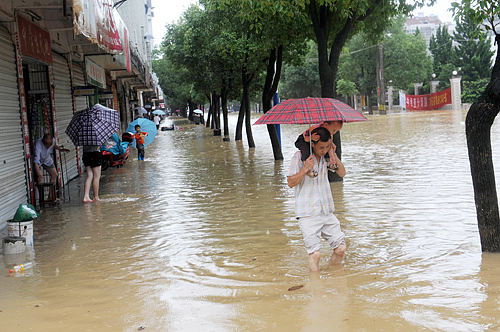|
 |
|
FLOODED CITIES: Several rounds of rainstorms paralyze the traffic in many cities in south China (XINHUA) |
Drainage Works
Heavy rainstorms are now sweeping south China, leaving many cities struggling practically in water. Nowadays, it seems rainstorms are certain to bring floods to cities. This may be partly because of urban developers' shortsighted practice of paying more attention to the city's surface while neglecting the underground.
City construction is expanding, with mushrooming skyscrapers and romantic European style streets. While cities' faces are turning increasingly modern and pretty, rainstorms, even one rainstorm, can easily flush away the shiny powder on the city's face and we have submerged streets and immobilized cars.
The measurement of a city's realization of modernization is not its surface, but its underground structure, or its heart. How many Chinese cities' hearts can withstand the test of storms?
In Ganzhou, Jiangxi Province, drainage works dating back to the Song Dynasty (960-1279) still operate well, ensuring smooth water drainage in various overflows or floods.
Today's China is not short of money or advanced technology, but city managers and builders are seriously lacking in a sense of responsibility and far-sighted design concepts. What we see are mostly short-lived projects constructed in a hurry. Urban construction is not supposed to be pushed just by temporary passion, but should be based on farsightedness.
Yangtze Evening News
Charity Problems
The Children's Welfare Home of Yibin in southwest China's Sichuan Province recently revealed they had found food and medicine passed their expiry dates in donations, which had to be thrown away. The same situation applies occasionally to donated clothes the institute receives.
For people to donate to charity organizations is a virtue, but if donated clothes are dirty and tatty, and food is expired, it not only hurts the beneficiaries, but is also against the spirit of the cause of charity.
As for the welfare institutes, they need and welcome social help and love. That's why they seldom reject social donations, fearing their rejection will hurt donors' desire to give. But this does not mean they welcome dirty, worn-out clothes and expired food and medicine in the name of charity.
By no means should anyone send rubbish to a charitable organization. Children in these institutions are sometimes more sensitive than normal children, and this sort of rubbish will easily hurt their feelings. Sometimes, they need respect more than other people.
On one hand, donors should act more responsibly, and on the other hand, these cases show China's charity causes are still weak and underdeveloped and need improvement.
Guangming Daily
Dairy Standards
Recently, at a dairy industry symposium in China, Wang Dingmian, President of Guangzhou Dairy Association, said China's dairy quality standards were very low. However, Nada Talmud, Secretary General of the Dairy Association of the Inner Mongolia Autonomous Region, said dairy quality standards of China should be based on China's national situation, as 72 percent of milch cows in China are fed by individual farmers.
Wang said before 2010, the standard for China's milk quality was 500,000 bacteria in a milliliter of raw material and protein content of 2.95 grams in 100 grams of milk. But the standards are slipping. Today's standards show bacteria numbers have increased by 1.5 million a milliliter while protein content has dropped 0.15 gram per 100 grams of milk.
If a product can't achieve the standard, let's make the standard lower and if the overseas market refuses it, let it be sold in the domestic market. When a certain industry is so tolerant of itself, it's really a sad thing for consumers, especially when dairy product scandals keep emerging now and then.
When it comes to food safety, it's better for the food industry to look up to world standards, instead of hiding behind the ridiculous shield of "China's national situation." It's unfair to assume Chinese intestines are immune to unsafe and even toxic food. The demand of Chinese people for food safety won't naturally decline just because this industry's safety standard is set very low.
For the dairy industry in China, turning to the country's national situation as a shield will only aggravate any trust crisis concerning it.
Qianjiang Evening News
University Enrollment
Although it has become increasingly easier for middle school students to enter college during the past decade, that does not necessarily mean more chances for them to go to prestigious universities. Now, some of China's top universities are sending signals of restricting enrollment, intending to enroll only excellent students, so as to ensure the enrollees better education.
Since 1999, Chinese colleges, including the top universities, began to expand enrollment, which resulted in the dilution of the original educational resources and a drop in students' quality.
But there is an exception. The University of Science and Technology of China resisted various pressures, saying no to enrollment expansion, thus managing to maintain the high quality of its students.
The enrollment expansion also involved virtually all the 985 Project universities, the 39 leading universities sponsored by government to promote development of China's higher education system. In general, universities are unable to practice elitist education if they enroll too many students. World-class universities such as Harvard, Yale and Princeton never let in more than 2,500 undergraduates a year.
Nevertheless, except for University of Science and Technology of China, the remaining 38 of the 985 Project universities kept enrolling more than 2,500 freshmen every year since 1999. To select the best and control the scale of enrollment will get nearer the goal of forging world-class universities.
China Youth Daily | 